
Mary Emelia Mayne (31 December 1858 – 12 August 1940), [1] was an Australian philanthropist.

Mary Emelia Mayne (31 December 1858 – 12 August 1940), [1] was an Australian philanthropist.
Mayne was born in Brisbane, Colony of New South Wales in 1858. The area would become part of the Colony of Queensland in 1859. Mary Emelia Mayne was the second youngest of five children of Irish parents, Patrick Mayne, a butcher and grazier, and his wife Mary McIntosh Mayne. She attended All Hallows' School, a Catholic girls' school in Brisbane, until 1877. [1] Thereafter she oversaw and hostessed many functions at Moorlands, the family home at Auchenflower. She and her siblings all inherited real estate, giving them independent means. Neither she nor her siblings would marry. [1]

James O'Neil Mayne (28 January 1861 – 31 January 1939), [1] one of her brothers, attended Brisbane Grammar School, graduated with a B.A. from the University of Sydney in 1884, and studied medicine at University College London, receiving the qualifications of Licentiate of the Royal College of Physicians (LRCS) and Membership of the Royal College of Physicians (MRCS) in 1890. [1] James Mayne worked as a doctor at the Brisbane General Hospital from 1891 until 1898. [1] James O'Neil Mayne died at Moorlands. [1]
The Mayne family made Moorlands available to the Red Cross working parties during World War I, and contributed to the Anglican St Martin's War Memorial Hospital.
James and Mary Emelia Mayne became the principal benefactors of the University of Queensland giving it 280 hectares of land at Pinjarra Hills for agricultural education in 1923. [2] After negotiations beginning in 1926, they paid a further £63,000 to resume over 281 hectares at St Lucia. This site became the current University of Queensland campus.

Mary Emelia Mayne died in the Mater Misericordiae Private Hospital (run by the Sisters of Mercy who also controlled her school, All Hallows') during World War II on 12 August 1940. Mary Emelia Mayne and James O'Neil Mayne are buried in the Toowong Cemetery in the family tomb, which the university was requested to maintain. [3]
Their wills demonstrate that James Mayne's estate was valued for probate at £113,334 and Emilia Mayne's at £83,375. Their chief assets were listed as the prestigious Brisbane Arcade, the Regent Building, [4] and Moorlands. Identical wills provided that the estates be applied in perpetuity for the university's medical school.
They are commemorated by the Mayne chairs of medicine and surgery, the Dr James Mayne Building at the Royal Brisbane and Women's Hospital, the Mayne String Trio and Mayne Hall where there is a bronze plaque of them by Kathleen Shillam. A portrait of Mayne by Melville Haysom hangs in the University of Queensland Art Museum which is named the James and Mary Emelia Mayne Centre.
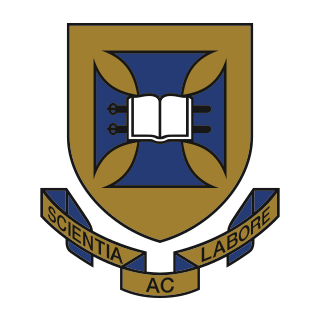
The University of Queensland is a public research university located primarily in Brisbane, the capital city of the Australian state of Queensland. Founded in 1909 by the Queensland parliament, UQ is one of the six sandstone universities, an informal designation of the oldest university in each state. UQ is also a founding member of edX, Australia's leading Group of Eight and the international research-intensive Association of Pacific Rim Universities.
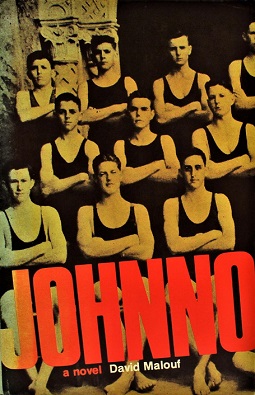
Johnno is a semi-autobiographical novel written by Australian author David Malouf and was first published in 1975. It was Malouf's first novel.
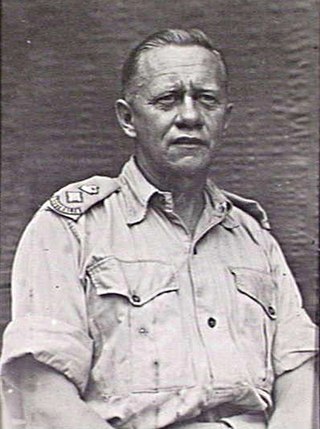
Frederick William Whitehouse was a noted geologist, born in Ipswich, Queensland, Australia.

The Mayne Inheritance is a non-fiction novel written by Queensland author Rosamond Siemon. It was first published in 1997 by University of Queensland Press, and a new edition with updated information was issued by the same publisher in 2003. The book won the Brisbane City Council's One Book One Brisbane competition in 2003.

John Anthony Hay was an Australian academic. He was Vice-Chancellor of Deakin University and the University of Queensland from 1996 to 2007.
Mayne may refer to:

St Margaret's Anglican Girls School is an Australian private Anglican day and boarding school for girls. The school is located in Ascot, an inner-northern suburb of Brisbane, Queensland.

All Hallows' School (AHS) is a Catholic day school for girls, located in Fortitude Valley, close to the central business district of Brisbane, Queensland, Australia.

Regent Theatre was a heritage-listed cinema at 167 Queen Street, Brisbane, Australia. It was designed by Richard Gailey, Charles N Hollinshed and Aaron Bolot and built from 1928 to 1929 by J & E L Rees and A J Dickenson. It was one of the original Hoyts' Picture Palaces from the 1920s. It is also known as Regent Building. The auditorium interior was largely lost when it was converted into a 4 screen complex in 1979–1980, but the building, including the surviving entrance and main foyer, was added to the Queensland Heritage Register on 21 October 1992.

Pinjarra Hills is a suburb in the City of Brisbane, Queensland, Australia. In the 2016 census, Pinjarra Hills had a population of 606 people.

Mother Mary Vincent Whitty, R.S.M., was an Irish religious sister known for her work in the colony of Queensland. She was a leading figure in the Institute of the Sisters of Mercy, both in Ireland and in its expansion into the Australian colonies.
Jane Gorry (1844-1891) was the first Queensland postulant of the Sisters of Mercy.
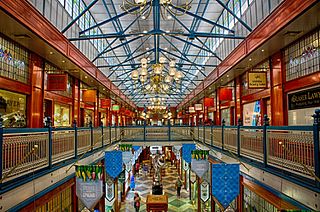
Brisbane Arcade is a heritage-listed shopping arcade at 160 Queen Street through to Adelaide Street in the Brisbane CBD, City of Brisbane, Queensland, Australia. It was designed by Richard Gailey, Junior and built in 1923 to 1924 by J & E L Rees and Forsyth & Speering, making it Brisbane's oldest shopping arcade. It was added to the Queensland Heritage Register on 21 October 1992.
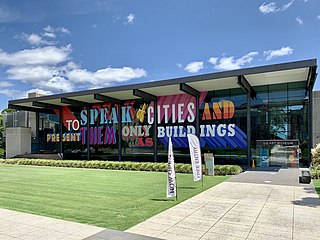
The University of Queensland Art Museum is the art museum and public gallery of the University of Queensland in the James and Mary Emelia Mayne Centre at the St Lucia campus. The University of Queensland Art Collection is now the second largest public art collection in Queensland. The building was formerly known as Mayne Hall.
George Henry Male Addison (1857–1922) was an Australian architect and artist. Many of his buildings are now heritage-listed.

Moorlands is a heritage-listed villa at 451 Coronation Drive, Auchenflower, Queensland, Australia. It was designed by Richard Gailey and was built c. 1892 by contractor Arthur Smith. It was added to the Queensland Heritage Register on 21 August 1992.
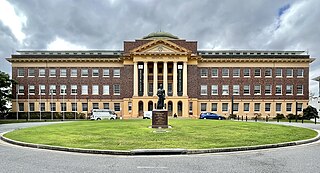
University of Queensland Mayne Medical School is a heritage-listed university building at 288 Herston Road, Herston, City of Brisbane, Queensland, Australia. It was designed by Raymond Clare Nowland and built from 1938 to 1939. It is also known as University of Queensland Medical School. It was added to the Queensland Heritage Register on 24 June 1999.

Great Court is a heritage-listed university colonnade at the University of Queensland, St Lucia, Brisbane, Queensland, Australia. It was designed by John (Jack) Hennessy and built from 1937 to 1979. It was added to the Queensland Heritage Register on 8 March 2002.

Sister Regis Mary Dunne RSM was an Australian scientist and Sister of Mercy, considered to be a pioneer in the field of genetics and bioethics.
Mary Deirdre Mahoney was an Australian medical practitioner and academic.